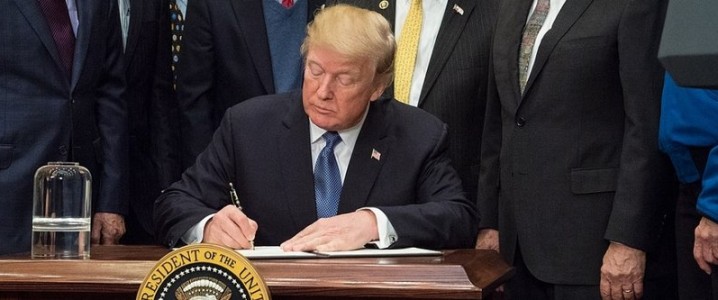
U.S. President-elect Donald Trump has weighed in on the UK’s energy policy to hike the windfall tax on North Sea oil and gas operators and become a clean energy superpower by boosting offshore wind development.
In a typical Trump fashion, the President-elect last week took to social media to blast the Energy Profits Levy (EPL), as the windfall tax is officially known, and to call for “getting rid of” the windmills.
Trump’s barb at the UK’s government comes as his current best buddy, Elon Musk, is trolling the UK Prime Minister Keir Starmer and the Labour Party and calling for resignations. On his own social media platform X, Musk has also suggested in recent days who would be best suited to be the leader of the new populist right-wing Reform UK party.
The UK is now in the crosshairs of Trump, too, with an issue dear to the President-elect – oil and gas drilling and production.
Trump has already made his U.S. energy policy priorities known—support for fossil fuels and repeal of some of President Biden’s environmental-oriented measures, including the pause on new LNG permitting and the minimum possible offshore oil and gas lease sales mandated by Congress.
While Trump can and will do all of the above to support the American oil and gas industry, he can only comment on and criticize the energy policy of the UK.
He did it, nonetheless.
Trump has called for opening up the UK North Sea to oil and gas and getting rid of windmills in response to the recent announcement by Texas-based Apache that it would cease oil and gas production in the region due to the uneconomical windfall tax.
“The U.K. is making a very big mistake. Open up the North Sea. Get rid of Windmills!” President-elect Trump posted last week on social media platform Truth Social.
The post contained an attached article about Apache’s recent announcement that it would exit the UK North Sea.
In November 2024, U.S. oil producer Apache said that it plans to cease oil production at its assets in the UK North Sea by 2030 due to the windfall tax on operators.
Apache’s parent company, APA Corporation, said in an SEC filing that its assessment of the impact of the Energy Profits Levy (EPL) resulted in findings that continued production in the UK North Sea would be uneconomical.
The ruling Labour Party’s Autumn Statement confirmed that the windfall tax on UK North Sea operators is rising to 38% from 35%, effective November 1, 2024. The tax will now expire on March 31, 2030, a year later than the previous tax regime. The government is also removing the 29% investment allowance.
Since the tax was initially introduced by the Conservative government at the height of the energy crisis in 2022, oil and gas companies operating in the UK North Sea have been calling for certainty in the regulatory and tax framework. Recent changes in policies and the rising taxes have driven away operators, who say that a lack of North Sea investments would only make the UK more dependent on oil and gas imports.
The UK windfall tax has made economics in the basin impossible for companies to invest, Brian Gilvary, the chairman of Ineos Energy, said last month.
“In our initial strategy we wanted to expand in the UK, particularly gas. And what has happened is that the tax regime makes that impossible,” Gilvary told the Financial Times, commenting on the prospects of the oil and gas arm that UK-based chemicals group Ineos created four years ago.
U.S. President-elect Trump, for his part, has been a vocal critic of offshore wind. In the United States, offshore wind faces an uncertain future under Trump’s second-term administration. The President-elect has criticized offshore wind as the most expensive form of energy which, Trump says, also ruins the environment.
Source: By Tsvetana Paraskova from Oilprice.com
